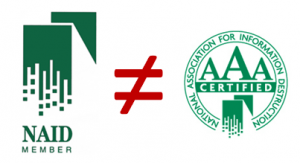 A couple of weeks ago we talked about some misleading logos you might find on an electronic recycler’s website that don’t actually mean anything; this week we’re covering some of the top legitimate certification logos that you should be looking for when evaluating vendors.
A couple of weeks ago we talked about some misleading logos you might find on an electronic recycler’s website that don’t actually mean anything; this week we’re covering some of the top legitimate certification logos that you should be looking for when evaluating vendors.
Back when Lifespan was founded in 2002, there were no electronics recycling or IT asset disposal certifications, or even accepted standards. There was an electronic media destruction standard that most people referred to – the DoD 5220-M (aka the “Department of Defense” data wipe) – but that’s about it.
When it came to electronics disposal, anyone could declare they were in the business of handling e-waste for other companies. The problem was that you, as a purchaser of these services, had no good way of knowing what was really happening to your material behind the scenes, and no way to know for sure if your vendor was telling you the complete truth about what they did with your electronics material.
Dag Adamson, Lifespan’s founder, along with other industry stakeholders, saw the need to bring some rigor and standardization to the industry’s processes. It was, and still is, important for the integrity of our company (and the industry as a whole) that customers could be confident in how their material was being handled and where exactly it was going.
Unlike some logos and “accreditations” you might see on a recycler or reseller’s website, these ITAD standards are actually relevant to ITAD companies and are audited by an acredited third party for compliance. Here’s an overview of just a handful to look out for when evaluating ITAD vendors to ensure they meet different environmental and security standards:
AAA Certification by NAID
NAID is an international trade association for the data destruction industry and offers “AAA Certification” (covering standards for both physical destruction and data sanitization) which was developed by information security professionals and is a recognized standard by organizations all over the world. Remember, “certification” and “membership” are two very different things – just because a company is a NAID member does not mean they meet any rigorous quality standards, so be sure todouble-check the logo and make sure you understand what it really means.
e-Stewards Certification
e-Stewards Certification is a leading certification that indicates companies meet some of the highest environmental and corporate responsibility standards. This certification requires a third-party to audit the company on a regular basis to ensure maximum data security, legal compliance with all laws, and that no hazardous e-waste ends up in landfills or is shipped to developing countries. Note that organizations can be listed as “in process” but they may or may not meet the rigourous standard. Only certified recyclers have passed the audit process and can claim to actually meet the requirements.
R2/RIOS Certification
This Institute for Scrap Recycling Industries’s (ISRI) RIOS standard, which is is based primarily on the requirements of ISO 9001, ISO 14001 and OHSAS 18001, was combined with the R2 Standard to create a more rigorous overall operational management system for electronic recyclers: R2/RIOS. R2/RIOS certification proves that an electronics recycler meets the highest standards for data privacy, environmental controls, and corporate responsibility.
For more information on current standards and compliance, check out this free whitepaper: Guide to Environmental Compliance in IT Asset Disposition.
Lifespan continues to play a leadership role in the data security and electronic recycling industry. In addition to the certifications we hold, we currently hold a seat on the e-Stewards Advisory Board, and Dag Adamson is a Director on the board at NAID and also on the NAID SSD Task Force. Industry best practices are very important to us, and we understand it is important to keep the industry moving forward with technology and market needs.


